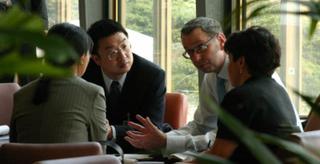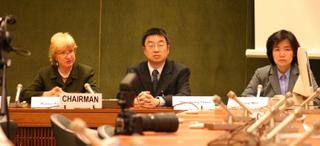Geneva Part II: Inside at the UN
Our faithful readers may recall that we went to Geneva for the annual meeting of the UN Commission on Human Rights (UNCHR), as members of the Falun Gong Human Rights Working Group (FGHRWG).
home of the UN at Geneva.
For those who aren't familiar with what that might actually mean, here's a brief sketch. The UNCHR meets for 6 weeks every year in March-April and is attended by over 3,000 country delegates and non-governmental organisation (NGO) representatives. It is a forum to examine troubling human rights situations around the world and, through reports and resolutions, to "name and shame" the biggest violator countries. It is meant to be a global moral authority and a voice for victims, but this "name and shame" function is essentially its only teeth. Fortuately, we discovered some good-hearted people there who will gum the perpetrators as much as they're able.
 Most of what bite the UNCHR has, comes from the Special Rapporteurs and Working Groups. These are independent, unpaid committees of / experts charged with investigating and reporting on specific aspects of global human rights violations. We were largely impressed with the caliber of these people. It is they who do most of the "naming and shaming", although even that has been toned-down in recent years since their 'big room' air-time to deliver their reports has been reduced to a paltry 15 min. Once the political niceties have been said, that doesn't leave a lot of time for the meat. The picture above is a couple of FGHRWG colleagues having an informal meeting with Stephen Toope, Chair of the Working Group on Enforced or Involuntry Disappearances and proud Canadian.
Most of what bite the UNCHR has, comes from the Special Rapporteurs and Working Groups. These are independent, unpaid committees of / experts charged with investigating and reporting on specific aspects of global human rights violations. We were largely impressed with the caliber of these people. It is they who do most of the "naming and shaming", although even that has been toned-down in recent years since their 'big room' air-time to deliver their reports has been reduced to a paltry 15 min. Once the political niceties have been said, that doesn't leave a lot of time for the meat. The picture above is a couple of FGHRWG colleagues having an informal meeting with Stephen Toope, Chair of the Working Group on Enforced or Involuntry Disappearances and proud Canadian.The Commission has 53 member states that are elected to 2-year terms. Although NGOs, observer countries and other organisations can be accredited to attend, only the 53 have voting rights. The dubious human rights record of many of the many members is often easy target for criticism. For example, current countries include the People's Republic of China (PRC), Cuba, Pakistan, Sudan and Zimbabwe; previous members include Algeria, Syria, and Vietnam. Libya was even chair 2 years ago! That kicked up a lot of dust in human rights circles.
 (left) The 'big room' where country delegates discuss (posture, accuse, avoid...) dire human rights situations around the world. To get in, you have to pass security where they take away "unauthorized" materials and packed lunches.
(left) The 'big room' where country delegates discuss (posture, accuse, avoid...) dire human rights situations around the world. To get in, you have to pass security where they take away "unauthorized" materials and packed lunches.Others say that it's good to have these countries included in order to engage them in the human rights dialogue, slowly educating them and bringing them on-board. However, from what we saw, they seem more interested in sinking the ship than sailing with it. The abusers tend to form a clique that works hard to prevent or highly water down any resolutions that might make one of them look bad. Since all resolutions require painstaking negotiation over every word and phrase to try to reach consensus, even before it goes to vote - Cindy can attest to it, she sat through some grueling sessions - there's ample scope to dilute, refute, pollute.
Here's one choice example. In one of the last drafting meetings of the resolution on the Elimination of all Forms of Intolerance and of Discrimination Based on Religion or Belief, the PRC delegate first applauded the committee on its hard work (required political platitude) and then proceeded to suggest one minor change that he was sure everyone would agree to: inserting the word "legal" into the phrase "... to ensure... constitutional and legislative systems provide adequate and effective guarantees of legal freedom of thought, conscience, religion and belief to all without distinction." Kind of negates the whole notion of guaranteeing freedom if you're at the mercy of the state to deem you legal. Fortunately, that's what the US and EU thought so they shut China down pretty squarely. Unfortunately, the PRC delegate would only let it go if they agreed to include an "...in accordance with their national legislation..." elsewhere in the document. Tit-tat, how about that? That's how you build consensus.
Our particular focus, of course, was China and exposing the Chinese Communist Party's (CCP) 6-year persecution of Falun Gong. We can proudly say that despite the general inefficacy of the Commission, we got a lot accomplished in terms of face-to-face meetings with country rep's and NGO people - all the stuff that happens in the corridors and over a paper cup of tea. We were encouraged by the generally high level of awareness of the situation in China, which is testament to the hard done in previous years.
 (left) NGO Session on Crimes Against Conscience.
(left) NGO Session on Crimes Against Conscience.The Working Group also hosted or co-hosted 4 NGO Parallel Meeting sessions addressing the many scary facets of the PRC's human rights abuses. Thus we are now good friends with the Tibetans, pro-democracy advocates, (house church) Christians, and Uighur Muslims. Along with Falun Gong, these 4 groups comprise what Chen Yonglin (the First Secretary from the Sydney consulate who defected) says the CCP terms "The 5 Poisons."
Our work with these groups confirmed for us once again the wonderful nature and rich diversity of so many peoples living under PRC rule. If only the CCP wasn't bent on eradicating them all...
We also learned first-hand how hard the Party works at preventing the bad word about themselves - i.e. truth - from getting out. For example, somehow notices promoting upcoming sessions critical of China's human rights record, disappear from boards and tables. Also, everywhere we went at the Commission we were shadowed by GONGOs - pseudo (Government Organised) NGOs created by the Chinese government to keep tabs on what the real NGOs were upto. It was pathetically obvious that these folks had no actual interest in human rights. Their sole purposes in coming to sessions were to automatically counter anything "anti-China" that was said and to take reams of notes. We did meet one woman who didn't fit that mould. She was either an unusually adept spy or a genuine member of China's fledgling civil society.


» Post a Comment